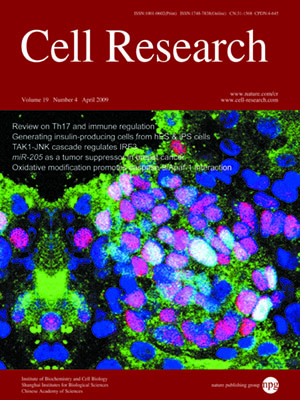
Volume 19, No 4, Apr 2009
ISSN: 1001-0602
EISSN: 1748-7838 2018
impact factor 17.848*
(Clarivate Analytics, 2019)
Volume 19 Issue 4, April 2009: 469-486
ORIGINAL ARTICLES
Repression of PKR mediates palmitate-induced apoptosis in HepG2 cells through regulation of Bcl-2
Xuerui Yang1,2 and Christina Chan1,2
1Department of Chemical Engineering and Materials Science, Michigan State University, East Lansing, MI 48824, USA
2Department of Biochemistry and Molecular Biology, Michigan State University, East Lansing, MI 48824, USA
Correspondence: Christina Chan,(krischan@egr.msu.edu )
The present study shows that double-stranded RNA-dependent protein kinase (PKR) regulates the protein expression level and phosphorylation of Bcl-2 and plays an anti-apoptotic role in human hepatocellular carcinoma cells (HepG2). In various types of cells, saturated free fatty acids (FFAs), such as palmitate, have been shown to induce cellular apoptosis by several mechanisms. Palmitate down-regulates the activity of PKR and thereby decreases the level of Bcl-2 protein, mediated in part by reduced activation of the NF-κB transcription factor. In addition to the level of Bcl-2 protein, the phosphorylation of Bcl-2 at different amino acid residues, such as Ser70 and Ser87, is also important in regulating cellular apoptosis. The decrease in the phosphorylation of Bcl-2 at Ser70 upon exposure to palmitate is mediated by inhibition of PKR and possibly by c-Jun N-terminal kinase (JNK), whereas the phosphorylation of Bcl-2 at Ser87 is unaffected by palmitate or PKR. In summary, PKR mediates the regulation of the protein level and the phosphorylation status of Bcl-2, providing a novel mechanism of palmitate-induced apoptosis in HepG2 cells.
Cell Research (2009) 19:469-486. doi: 10.1038/cr.2009.25; published online 3 March 2009
FULL TEXT | PDF
Browse 1850


